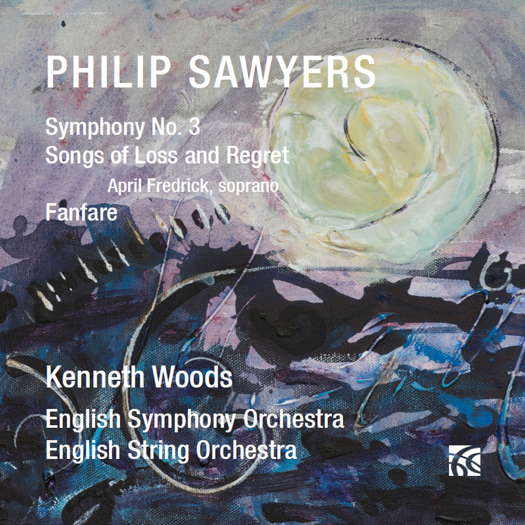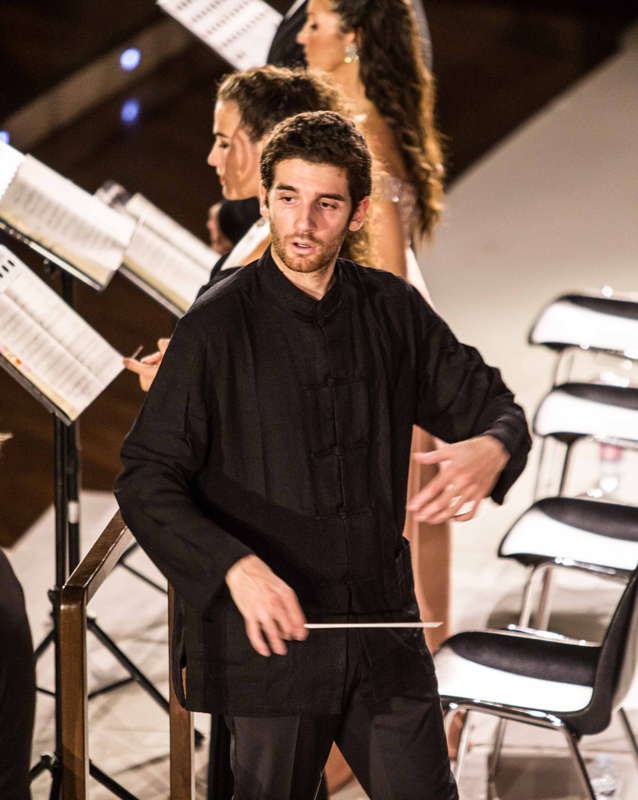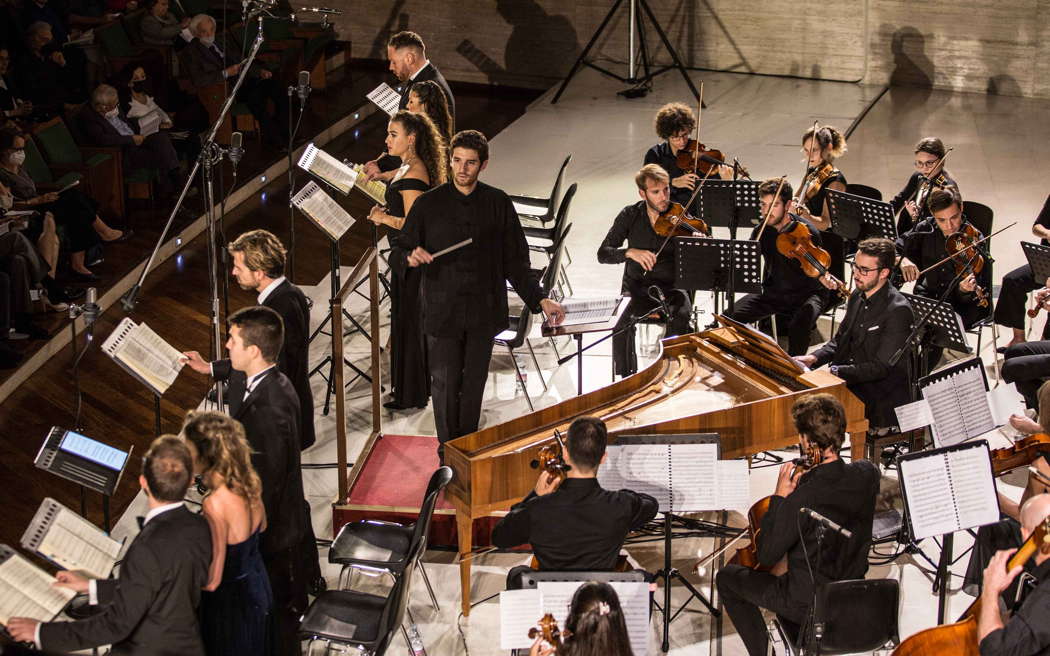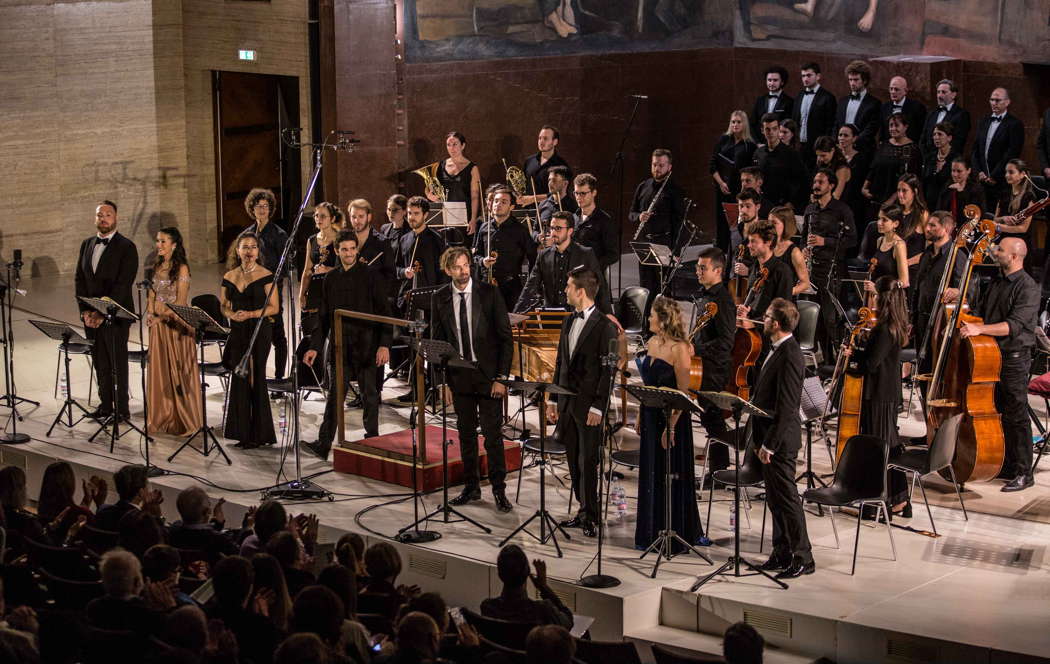- Ahmed Adnan Saygun
- Lorin Maazel
- Josip Slavenski
- Trovatore
- Rudolf Escher
- Herbert O Fox
- Rudolf Kehrer
- Drunken Sailor tango
 SPONSORED: CD Spotlight. View from the Celli - Philip Sawyers' Symphony No 3 impresses Alice McVeigh.
SPONSORED: CD Spotlight. View from the Celli - Philip Sawyers' Symphony No 3 impresses Alice McVeigh.
All sponsored features >>
 DISCUSSION: What is a work? John Dante Prevedini leads a discussion about The performing artist as co-creator, including contributions from Halida Dinova, Yekaterina Lebedeva, Béla Hartmann, David Arditti and Stephen Francis Vasta.
DISCUSSION: What is a work? John Dante Prevedini leads a discussion about The performing artist as co-creator, including contributions from Halida Dinova, Yekaterina Lebedeva, Béla Hartmann, David Arditti and Stephen Francis Vasta.
Full of Panache
GIUSEPPE PENNISI writes about a recent performance of 'Don Giovanni' in Rome
In perfect continuity with the previous one, the 2022-23 season of the IUC - University Institution of Concerts of the University 'La Sapienza' of Rome - has an ambitious program: it ranges from Renaissance polyphony to today's music. The inauguration of the season with Wolfgang Amadeus Mozart's Don Giovanni in concert form for three evenings goes in this direction: 15, 17 and 18 October. I was at the 15 October 2022 performance. This is an original production that brings back to the IUC the Canova Chamber Orchestra and its founder/conductor Enrico Saverio Pagano, artists who have been in residence at the institution since last season, confirming the attention and enhancement of the young talent always pursued by the IUC.
This is an intent further reiterated this year by the entry of Enrico Saverio Pagano in the IUC Artistic Council, supported by President Rinaldo Gentile. 'It is not often that an opera like Don Giovanni is entrusted to a conductor under thirty', says Enrico Saverio Pagano. 'Yet, as happens with all masterpieces, Don Giovanni also takes on a particular character and meaning depending on the age in which it is faced. It is a privilege for me to have the opportunity to try my hand at this work at the age of twenty-seven, even more so in relation to the fact that it will be performed in concert form, where music will be in the foreground. Working with IUC has also allowed me to build the vocal cast, in which emerging young people are near to leading names on the international scene. This possibility of casting will allow you not to have to adapt the musical choices to the voices you have available, but to proceed in the opposite way: that is, having chosen the voices in relation to the style and balance that I consider appropriate for the reading of the work.'

Enrico Saverio Pagano conducting Mozart's Don Giovanni in Rome on 15 October 2022. Photo © 2022 Max Pucciariello
Born in Rome in 1995, winner last year of one of the TOYP (The Outstanding Young Persons) awarded by the Junior Chamber International – Italy, Enrico Saverio Pagano returns to lead his orchestra in the 'Prague version' of Mozart's masterpiece using a cast made up of some of the most brilliant emerging voices. In addition to the three performances in Rome, additional performances are planned in the North of Italy.
Don Giovanni is probably the opera on which the most has been written and, precisely for this reason, it has been much misrepresented over the decades, also attributing to it meanings very far from what was probably the initial idea of the authors. We must not forget that Mozart and Da Ponte were first and foremost two great men of theater, who knew the taste of the public and who knew how to amaze and satisfy it. The reading by the Canova Orchestra and the singers focuses on the contrasts and surprises of Mozart's theater, on the vital momentum and freshness that his music always contains, and on the energy that is in the DNA of a group of young performers. It is a lively reading. In Rome we remember some excellent productions of the work - for example the one directed by Gigi Proietti and the conducting of Gianluigi Gelmetti in 2002, but also that of 2019 literally destroyed by the scenic reading of Graham Vick.
Don Giovanni is the second of the three 'drammi giocosi' that the Austrian composer wrote on a libretto by Lorenzo Da Ponte (who was in the service of the Holy Roman Emperor). Da Ponte drew on numerous literary sources of the time. It follows Le nozze di Figaro (K 492) and precedes Così fan tutte (K 588). It was composed between March and October 1787, when Mozart was thirty-one years old. Commissioned by Emperor Joseph II, also following the success of Don Giovanni o sia Il convitato di pietra by Giuseppe Gazzaniga, it was not staged for the first time in Vienna, but at what is now called the Bohemian Estates Theatre in Prague. Don Giovanni is considered one of the greatest masterpieces of Mozart, of Western music and culture in general. The Estates Theatre of Bohemia is small and elegant; probably, the 'pit' did not contain, at the time, a number of musicians much higher than those of the Canova Chamber Orchestra. It is necessary to keep this in mind when evaluating editions presented in large theaters that show off huge orchestral ensembles for a work that, to preserve its freshness, requires anything but that.
In short, stylistically, Don Giovanni is poised between opera seria and opera buffa and, in the same way, the general tone oscillates between tragedy and comedy, thus well justifying the subtitle dramma giocoso with which Da Ponte seals the entire opera. In fact, arias and recitatives of the two acts are preceded by a symphony with a matrix that is anything but cheerful; initially, it would not find reason to have been written with such dramatic tones, given what is expected from a 'comedy', but which fully finds its explanation at the end of the work, in which it reappears and you can catch, in the succession of sounds, the idea of an almost epic cyclicality in the narration, which seems, with its concentric circles, to gradually wrap the body of Don Giovanni until it tightens it to drag it into the afterlife. From the formal point of view, it is an opera buffa (as Mozart calls it in his catalog), with the presence of elements taken from opera seria, such as the pieces written for Donna Anna, Don Ottavio and Donna Elvira.
The opera premiered in Prague on 29 October 1787 to great acclaim. After the great success of Prague, the opera was performed in Vienna in the Burgtheater in May of the following year. Since the rather conservative Viennese public would probably have reluctantly accepted the opera in its original version, Mozart made quite a few cuts and some major modifications. The main cut concerned the ending of the second act, where scene twenty was eliminated, in which all the characters find themselves commenting on the end of Don Giovanni, with the final Concertato in D major that contains the final moral: 'This is the end of those who do badly'.
In essence, in the Viennese version, the opera ends with scene nineteen, namely the contention of Don Giovanni with the Commendatore and his descent into hell in the midst of the chorus (low solos) of damned souls. This artistic choice by Mozart was probably dictated by wanting to conclude the work in the same key (D minor) in which the overture begins, thus giving it a cyclical aspect. The dispute between the supporters of the Prague score and those of the Viennese score arose almost immediately and continues to this day.
We come to the performance. It is not a reading in the form of a concert in the strict sense but almost a mise en éspace in which the singers also act. The Canova Chamber Orchestra, conducted with a light manner by Enrico Saverio Pagano, treats the opera with ironic brio. It is a brisk and light reading that dresses the Prague Mozart perfectly. Even scenes that are often presented in a highly dramatic way, such as those of confrontation with the Commendatore, acquire a light enamel.

Enrico Saverio Pagano conducting the Canova Chamber Orchestra in Mozart's Don Giovanni in Rome on 15 October 2022. Photo © 2022 Max Pucciariello
To impersonate Don Giovanni is a singer already known internationally: Vittorio Prato, one of the most acclaimed baritones on the current opera scene, fresh from the success of Meyerbeer's Les Huguenots at the Theatre La Monnaie in Brussels. His is a swaggering and cynical Don who is crushed by his own arrogance.
The others are almost all very young, beginners or almost so, but full of freshness. Leporello is Giacomo Nanni, who has already played the servant of the Don not in the Mozart version but in Alessandro Melani's L'Empio punito, recently successfully staged in Rieti and Rome and reviewed in this magazine on 5 October 2019.
In the male group, Marco Ciaponi's Don Ottavio, with a beautiful bel canto intonation and Salvo Vitale's Commendatore, a deep bass with a vast vocal extension, stand out. Masetto, sung by Matteo Mollica, who comes from the As.Li.Co school, is also of a good level. In the female group, Sabrina Cortese is a highly dramatic Donna Anna, Michela Guarrera a slightly hysterical Donna Elvira and Giulia Bolcato a Zerlina who is, at the same time, a simple peasant and sexy.

Mozart's Don Giovanni in Rome on 15 October 2022. Photo © 2022 Max Pucciariello
There were accolades and ovations. This was a performance to remember. I hope that the IUC will produce a DVD.
Copyright © 22 October 2022
Giuseppe Pennisi,
Rome, Italy



